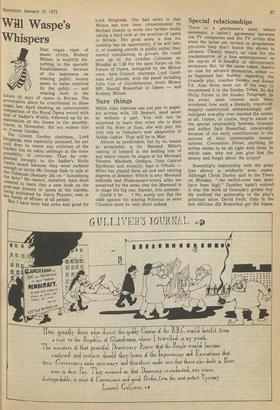Will Waspe's Whispers
That rogue viper of music critics, Rodney Milnes, is mightily disturbing to the operatic Establishment because of his insistence on relating public money spent to value received by the public — and relating both to the future (if any) of opera in Britain. The provocative piece he contributed to these pages last April (making an unfavourable comparison of the Royal Opera record with that of Sadler's Wells), followed up by an elaboration of the theme in the monthly, Opera, in November, did not endear him to Covent Garden. The Covent Garden chairman, Lord Drogheda, was especially incensed, for not Only does he resent any criticism of the Garden but he takes umbrage at the mere Possibility of criticism. Thus he complained strongly to the Sadler's Wells °Pere board because they were reckless enough to invite Mr George Gale to talk at the Coliseum (January 24) on "Subsidising the Arts." He cannot, therefore, have been Cheered to learn that a new book on the post-war history of opera at the Garden, being published by Davis Poynter, was in the hands of Milnes of all people. But I have both bad news and good for Lord Drogheda. The bad news is that Milnes has now been commissioned by Michael Joseph to write two further books taking a hard look at the position of opera in Britain. The good news is that his lordship has an opportunity, if he will take it, of crossing swords in public rather than merely complaining in private. He could turn up at the London Coliseum on Monday at 7.30 for the open forum on the Future of Opera, instigated by the Milnes view. Arts Council chairman Lord Goodman will preside, with the panel including John Cox of Glyndebourne, Ernie Money MP, Harold Rosenthal of Opera — and Rodney Milnes.
Sure things
While John Osborne can put pen to paper, his actress wife, Jill Bennett, need never be without a part You will not be surprised to learn that when she is done with his West of Suez, she will play the title role in Osborne's new adaptation of Hedda Gabler. That will be in May. Almost as predictable, but by no means so acceptable, is Sir Bernard Miles's casting of himself in the leading role of any major classic he stages at his Mermaid Theatre. Macbeth, Oedipus, John Gabriel Bjorknaan and, recently, Iago in Othello — Miles has played them all and met varying degrees of disaster. Which is why Mermaid habituds and Shakespeare-lovers alike are unnerved by the news that the Mermaid is to stage the big one, Hamlet, this summer. Could it be ... ? No, surely not, But the odds against his playing Polonius or even Claudius must be very short indeed.
Special relationships
There is a gentlemen's (and, where necessary, a ladies') agreement between the TV companies and the TV critics that when the latter are invited to programme previews they don't knock the shows in advance. Clearly there's no case for the condemnation of a free entertainment on the say-so of a handful of idiosyncratic reviewers. But, by the same token, there's no case for advance promotion, either as happened last Sunday regarding the Granada play, Another Sunday and Sweet PA. Alan Brien went out of his way to recommend it in the Sunday Times. So did Philip Purser in the Sunday Telegraph. In the event, most viewers must have wondered how such a dismally conceived, sloppily constructed, embarrassingly selfindulgent non-play ever reached the screen at all. Unless, of course, they're aware of the special relationship between Granada and author Jack Rosenthal: conceivably because of his early contributions to the success of their interminable moneyspinner, Coronation Street, anything he writes seems to be all right with them. In which case, why not just give him the money and forget about the scripts?
Rosenthal's relationship with the press (see above) is evidently even cosier. Although Christ Dunley said in the Times on Monday, the switch-over rate must have been high," Dunkley hadn't noticed it was the work of Granada's golden boy. He credited the authorship to the play's principal actor, David Swift. Only in the late editions did Rosenthal get the blame.










































 Previous page
Previous page